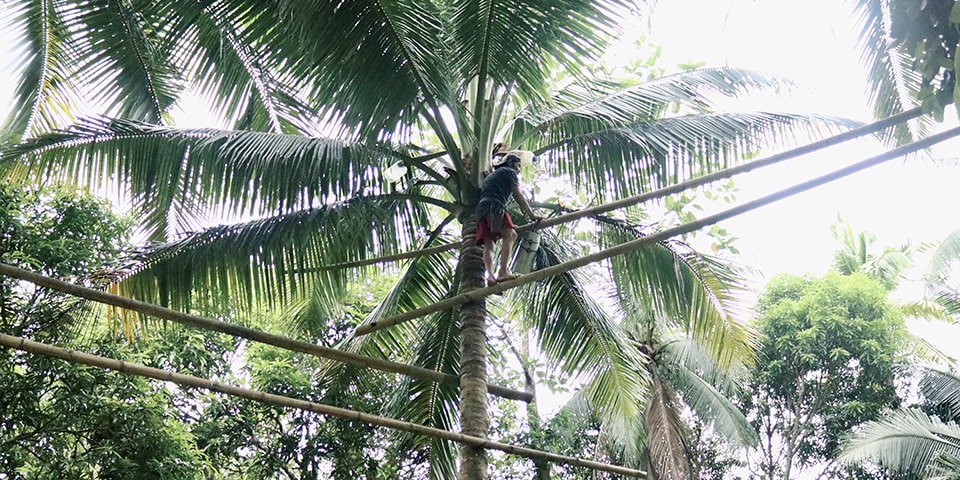 A mangangarit (sap collector) demonstrates coconut sap harvesting in Macalelon, Quezon.
A mangangarit (sap collector) demonstrates coconut sap harvesting in Macalelon, Quezon.
QUEZON PROVINCE—The Southeast Asian Regional Center for Graduate Study and Research in Agriculture (SEARCA), in partnership with the Office of the Provincial Agriculturist of Quezon, recently concluded a series of trainings for coconut farmers in Quezon Province held on 18-20 September 2024.
These trainings under the project Development of Coconut Industry Growth Areas in the Province of Quezon are designed to equip individual farmers and farmer associations or cooperatives on high-value crops and livestock integration, as well as marketing strategies for coconut products. The trainings also included hands-on demonstration on coconut sap-based products processing, including sugar, lambanog (coconut wine or spirit), and virgin coconut oil (VCO).
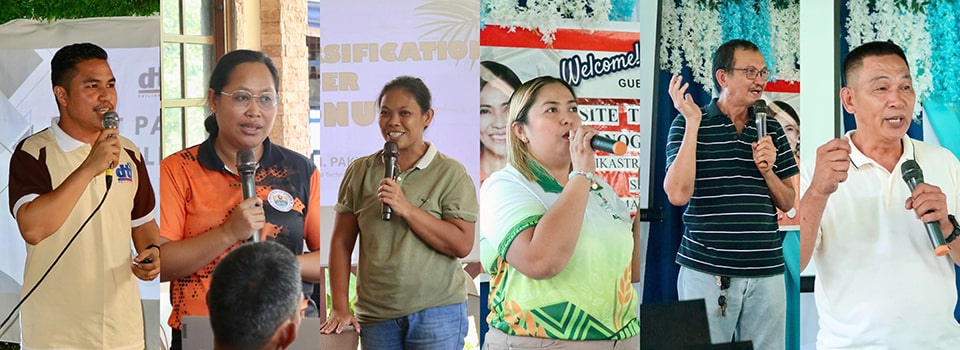 The speakers in the training series are: (L-R) Mr. Jerwin Samson, Coconut Farmers and Industry Development Project Coordinator, Department of Trade ad Industry-Quezon; Dr. Milcah Valente, Quezon Provincial Veterinarian; Ms. Lavenia Pakingan, Agricultural Technologist, MAO-Pagbilao; Ms. Astralet Marbella, Owner, Mikastra Integrated Farm; Mr. Gideon Salamat, Production Supervisor, Primero VCO Plant; Mr. Delio Sinapilo, Owner, Coco Deli Coconut Products.
The speakers in the training series are: (L-R) Mr. Jerwin Samson, Coconut Farmers and Industry Development Project Coordinator, Department of Trade ad Industry-Quezon; Dr. Milcah Valente, Quezon Provincial Veterinarian; Ms. Lavenia Pakingan, Agricultural Technologist, MAO-Pagbilao; Ms. Astralet Marbella, Owner, Mikastra Integrated Farm; Mr. Gideon Salamat, Production Supervisor, Primero VCO Plant; Mr. Delio Sinapilo, Owner, Coco Deli Coconut Products.
The session Marketing Strategies for Coconut By-Products covered topics on packaging, labeling, and current market trends. Coconut farmers from Catanauan and Lopez learned effective packaging methods and developed branding strategies for their products. The training also provided insights into the performance of the coconut trade, along with an analysis of prevailing market trends to enable farmers to position their products better in the competitive marketplace. This comprehensive approach aimed to enhance their marketing expertise, contributing to their coconut-based enterprises' sustainability and profitability.
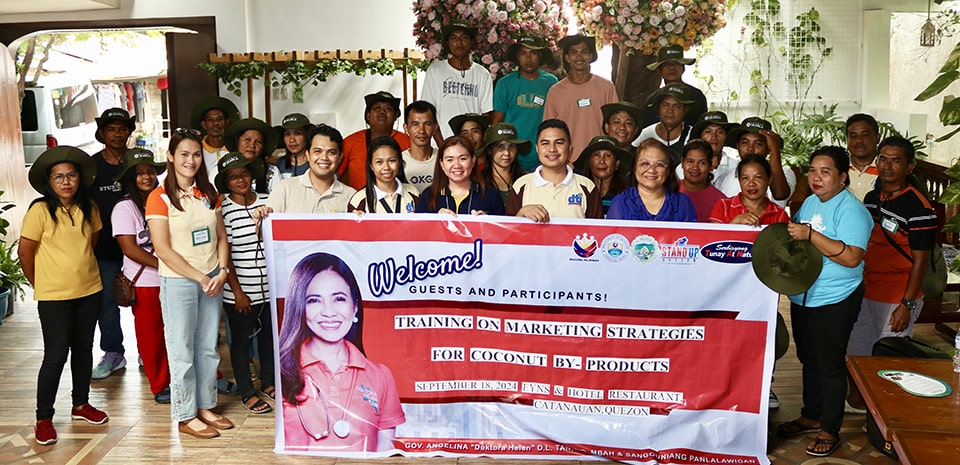 Coconut farmers from Catanauan and Lopez and training facilitators flank Mr. Jerwin Samson (4th from right) who covered the topic "Marketing Strategies for Coconut By-Products."
Coconut farmers from Catanauan and Lopez and training facilitators flank Mr. Jerwin Samson (4th from right) who covered the topic "Marketing Strategies for Coconut By-Products."
The training in Pitogo, Quezon, attended by coconut farmers from Pitogo, Macalelon, and Catanauan, focused on high-value crops integration with livestock, such as swine, poultry, and small and large ruminants. Also covered was the topic of intercropping with various crops, including cash crops, food crops, and those that enhance nutritional security to generate year-round farm income. The session emphasized product diversification, the value addition of coconut intercrops, and the recycling of waste biomass through vermicomposting.
A hands-on workshop guided the farmers in selecting and designing intercropping strategies tailored to their one-hectare plots. This interactive approach encouraged informed decision making on the types of crops most suitable for their land, maximizing both productivity and sustainability. The session aimed to empower farmers with the knowledge and tools to enhance farm efficiency, diversify income streams, and contribute to environmental conservation through sustainable agricultural practices.
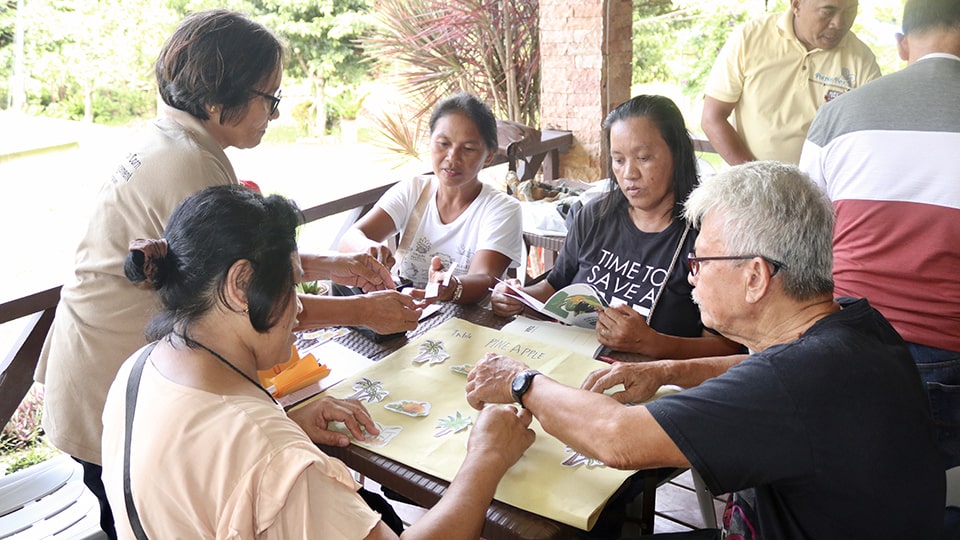 Coconut farmers from Pitogo, Macalelon, and Catanauan design intercropping strategies tailored to their one-hectare plots.
Coconut farmers from Pitogo, Macalelon, and Catanauan design intercropping strategies tailored to their one-hectare plots.
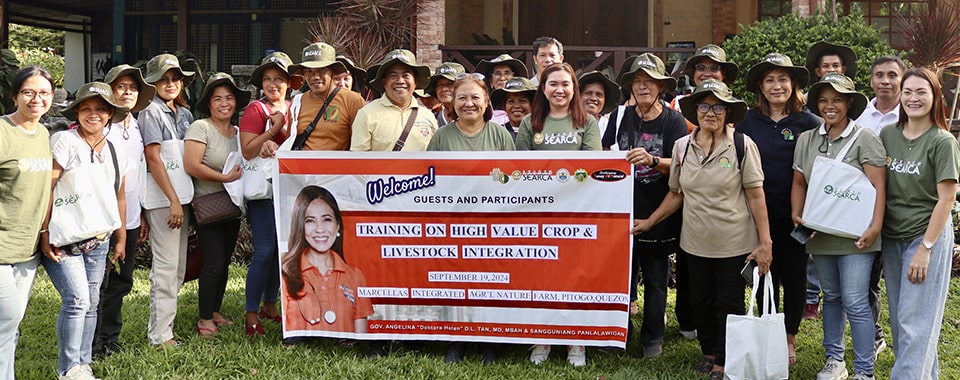 Participants, facilitators, and lecturers in the Pitogo, Quezon leg of the training series
Participants, facilitators, and lecturers in the Pitogo, Quezon leg of the training series
The training program concluded in Macalelon, Quezon, with participating farmers from Catanauan, Pitogo, and Macalelon. During this final session, the farmers engaged in hands-on training focused on producing lambanog, VCO, and coco sugar. They were introduced to best practices in processing these coconut by-products, enhancing their understanding of quality standards and efficient production techniques. A key highlight of the event was the opportunity for farmers to sample various coconut-based products brought by the speakers from their production lines. The taste testing allowed the participants to assess the quality of the finished products firsthand.
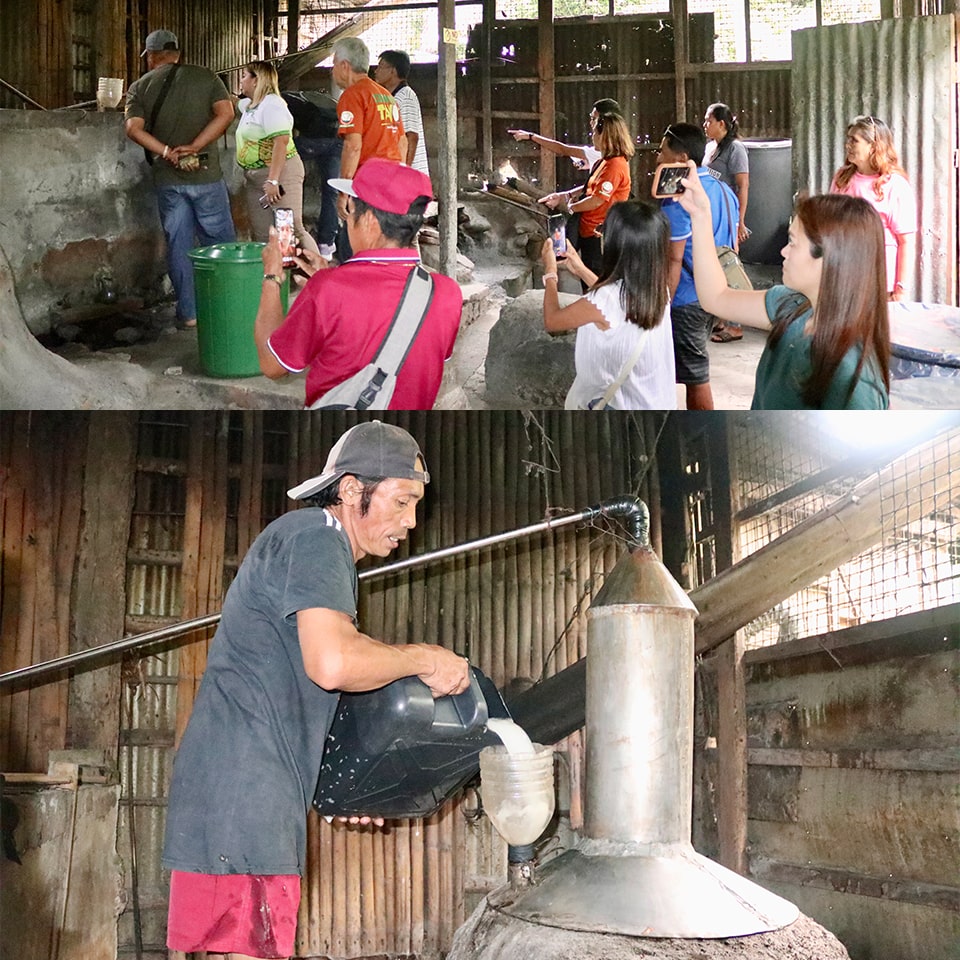 (Top) Participants tour a farm in Macalelon, Quezon and (bottom) witness the preliminary processing of coconut sap (tuba) for lambanog production.
(Top) Participants tour a farm in Macalelon, Quezon and (bottom) witness the preliminary processing of coconut sap (tuba) for lambanog production.
In addition to the practical training, the farmers were taken on a farm tour and witnessed a demonstration on the proper techniques in collecting coconut sap, the primary ingredient for lambanog and coco sap sugar. This immersion reinforced the importance of accurate and sustainable sap collection practices that are critical for maintaining product quality and optimizing yields.
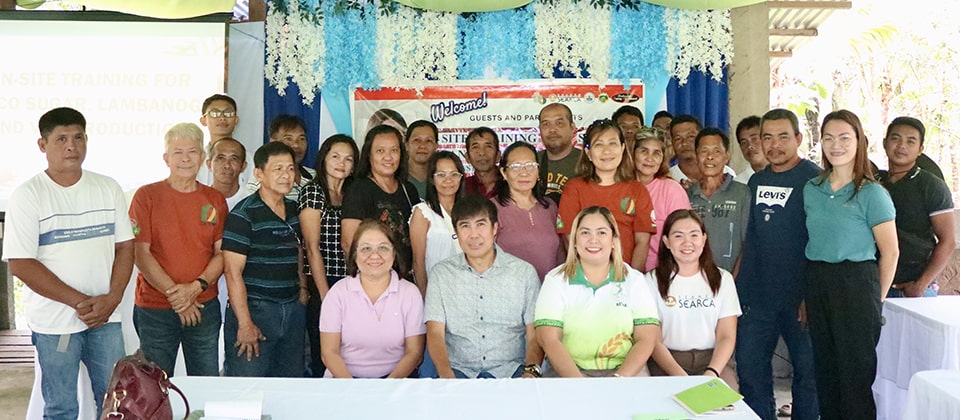 Catanauan, Pitogo, and Macalelon farmers and facilitators pose with Hon. Artemio Mamburao, Mayor of Macalelon, Quezon, during the hands-on training on lambanog, VCO, and coco sugar production.
Catanauan, Pitogo, and Macalelon farmers and facilitators pose with Hon. Artemio Mamburao, Mayor of Macalelon, Quezon, during the hands-on training on lambanog, VCO, and coco sugar production.
The training series was a comprehensive journey that equipped the farmers with various skills from production to marketing. This skill set will empower them to diversify their products and increase their income potential in the coconut industry.